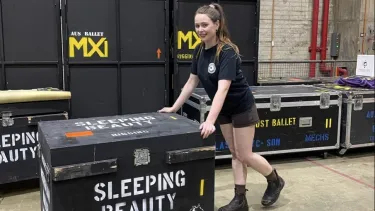Meet Holly

Meet Holly, our Staging Technician - Flyperson.
What is your job at the Sydney Opera House?
I work as a staging technician. My job involves the construction and operation of stage scenery. Within this role I act as a flyperson who operates the automated control system within a venue to move the flown elements of a show.
Can you describe a typical day/week in your role?
A typical week for me usually involves working alongside our resident clients, such as Opera Australia or The Australian Ballet.
Often, we have multiple shows running at once, so a major part of my role is managing the changeover from one production to another. This involves striking sets, flooring, and cloths to storage to make room for the new show. As a flyperson, I operate the automated bars that hold scenery, moving flown pieces into position so the stage crew can work on them safely.
Once the stage is cleared, we build the new production typically from the ground up. I assist on stage with laying floors, setting scenic trucks, and bolting set together. When everything is in place, all elements are set to their starting positions for top of show.
During the performance, I fly out the curtain to reveal the opening scene and continue to operate the automated cues throughout, moving flown elements as called by the stage manager to facilitate live scene changes and interval changeovers.
Once the performance concludes, we strike the set or reset the show, ready for the next production.
What do you enjoy most about your job?
I feel a great sense of pride in contributing to a production. I am a big part of what brings a show to life and adds the behind-the-scenes magic. I enjoy being one cog in an intricate machine working alongside a team where every role is essential.
I also appreciate the balance of the work: part of my role is technical, programming and operating automation systems, while the other part is hands-on, building, rigging, and moving scenery. It’s a job that engages both my mind and my body, keeping each day dynamic, challenging, and rewarding.
What are the biggest challenges?
One of the biggest challenges in this role is managing the hours. Theatre isn’t a nine-to-five job — I often work late nights, early mornings, and everything in between, with little consistency from week to week. Shifts can be long and physically demanding, especially during changeovers when entire sets need to be struck, stored, and rebuilt in tight timeframes.
There’s also a significant amount of responsibility involved. Operating the fly system means moving large scenic elements above performers and crew, so precision, focus, and safety are critical.
It’s also a very physical role. Lifting, heavy scenery and being on your feet for hours at a time can be exhausting, especially when paired with irregular hours. It requires stamina.
What skills and/or experience are necessary to undertake this job?
There is a great deal of responsibility in my role. Operating the fly system involves moving large scenic pieces above performers and crew, so precision, focus, and safety are critical. It requires listening intently and following instructions carefully to ensure every movement is executed smoothly and safely.
You also need to be able to troubleshoot and problem-solve under pressure — if something goes wrong during a performance, there’s no pause button. You have to assess the situation quickly, communicate clearly with the stage manager and crew, and find a safe solution in real time, all while the show continues around you.
What skills did you have already, before entering this career pathway?
Before entering this career pathway, I already had strong communication skills and the ability to listen. I’ve always been observant and detail-oriented, which helps me anticipate what’s needed on stage. Being able to look ahead and pre-empt what’s coming next has allowed me to stay prepared and proactive in fast-paced, high-pressure environments
What inspired you to pursue this career path?
I was undoubtedly captivated from a young age by the bright lights and velvet curtains of the stage. I would watch as walls moved seemingly of their own volition to reveal some new and exciting scene I was yet to discover. There is a magic to it. Illusion and trickery. Sleight of hand that goes unseen. I was in awe of it all and wanted to be in the thick of it.
From one night to the next, we can transport you from 19th-century Paris to pre-war Berlin, an enchanted forest, or an underwater kingdom. We can make it snow in the middle of summer or, quite literally, hang the moon. We build entire worlds within our own — places that people can escape to even if only for a night.
How did you get started?
I was a recent film graduate when I unintentionally stumbled into this world. I knew I was interested in set and production design, and I saw this job as an opportunity — a chance to get my hands dirty and see, up close how a production is built.
I applied having never worked on a stage, and over the past few years I’ve built a strong foundation in technical stagecraft at the Opera House, laying the groundwork for a career in this industry.
What advice would you give to someone who was considering a career as a flys technician?
My advice would be to gain as much hands-on experience as possible and not be afraid to get your hands dirty. Talk to people, ask questions, and stay curious — you’ll learn the most from those working around you.